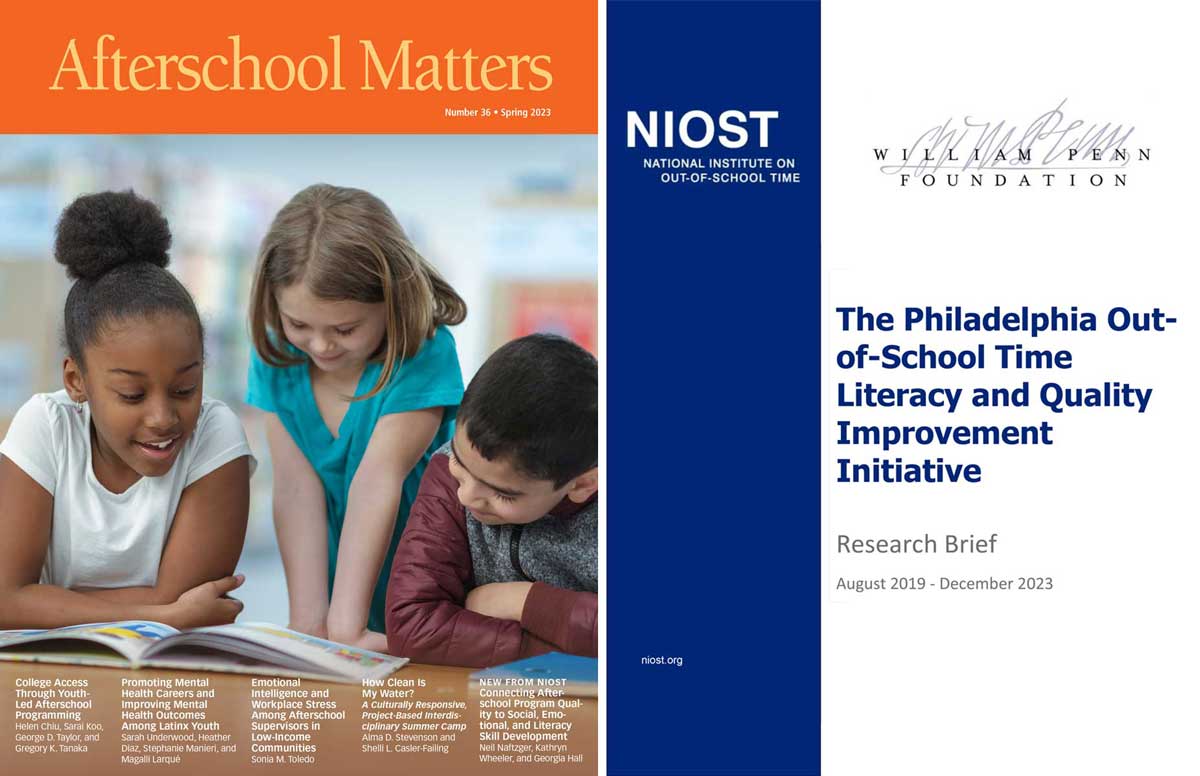 When the School-Age Childcare Project was founded in 1978, it brought national attention to the importance of out-of-school time (OST). Today, NIOST is helping OST programs embed literacy into everyday practices.
When the School-Age Childcare Project was founded in 1978, it brought national attention to the importance of out-of-school time (OST). Today, NIOST is helping OST programs embed literacy into everyday practices.
 Photo caption: (L to R): Kathryn Wheeler, Kathy Schleyer, Ellen Gannett, Nancy Marshall, and Georgia Hall during Nancy Marshall's retirement celebration.In the fall of 2022, WCW celebrated the retirement of Senior Research Scientist Nancy Marshall, Ed.D., and Senior Strategist Ellen Gannett, M.Ed.
Photo caption: (L to R): Kathryn Wheeler, Kathy Schleyer, Ellen Gannett, Nancy Marshall, and Georgia Hall during Nancy Marshall's retirement celebration.In the fall of 2022, WCW celebrated the retirement of Senior Research Scientist Nancy Marshall, Ed.D., and Senior Strategist Ellen Gannett, M.Ed.
 National Institute on Out-of-School Time staff at 2019 National AfterSchool Association Annual Convention in New York, NYEllen Gannet, M.Ed., was honored during the 2019 National AfterSchool Association Annual Convention for her decades of leadership in the out-of-school time field.
National Institute on Out-of-School Time staff at 2019 National AfterSchool Association Annual Convention in New York, NYEllen Gannet, M.Ed., was honored during the 2019 National AfterSchool Association Annual Convention for her decades of leadership in the out-of-school time field.
 November 23, 2018
November 23, 2018
Afterschool Matters reflects on the out-of-school time field's ability to provide students with experiences outside of the classroom that give them opportunities to stretch their skills, grow friendships, and challenge limits.

From afterschool programs to conversations about sex, research from WCW recognizes the profound ways adults can ensure healthy adolescent development.
by Ellen Gannett, M.Ed. and Elizabeth Starr, M.Ed., National Institute on Out-of-School Time
As expectations for high-quality afterschool and outof-school time (OST) programs continue to rise, a skilled, stable and committed OST workforce is critically important. Yet supports for youth workers, and resulting staff quality, remain uneven at best due in part to a highly fragmented landscape. Compensation remains stagnant and opportunities for professional advancement and public recognition remain practically non-existent.
Research & Action Report, Fall/Winter 2015
Acceptances, Appointments & Recognition
Ellen Gannett, M.Ed., director of the National Institute on Out-of-School Time at the Wellesley Centers for Women (WCW), is serving on a committee organized by the National Academies of Sciences, Engineering, and Medicine to plan a workshop on character education. The purpose is to review the literature on character education focusing on out-of-school programs, identify promising practices from the research, and explore the challenges of measuring the efficacy of character education programs.
For Immediate Release: March 19, 2014
For immediate release: February 27, 2014
 The ExpandED Exchange blog June 19, 2012
The ExpandED Exchange blog June 19, 2012Research & Action Report, Spring/Summer 2012
by Ellen Gannett, M.Ed.
The current debate on the virtues, definition, and efficacy of expanded learning opportunities (ELO) is familiar and welcome. With over 30 years in the field, I have watched the landscape of the out-of-school time field twist and turn by the decade and I am seeing earlier ideas presented in new terminology. Back in 1982, when the first director of the National Institute on Out-of-School Time (NIOST), Michelle Seligson and co-author, James Levine wrote the inaugural School Age Child Care: An Action Manual, their guiding premise was that “solutions are really to be found at the community level, and that they can best be developed by mobilizing people with similar interests to help one another.” The book emphasized a model of service delivery called “the partnership” between schools and other community groups and agencies. While it has taken decades to get here, there is promise in ELO if we can overcome previous barriers.
by Ellen Gannett, M.Ed.
December 13, 2011
The current debate on the virtues, definition, and efficacy of expanded learning opportunities (ELO) is familiar and welcome. With over 30 years in the field, I have watched the landscape of the out-of-school-time field twist and turn by the decade and I am seeing earlier ideas presented in new terminology. Back in 1982, when the inaugural director of the National Institute on Out-of-School Time (NIOST), Michelle Seligson, and her co-author, James Levine, wrote the first School Age Child Care: An Action Manual, their guiding premise was that “solutions are really to be found at the community level, and that they can best be developed by mobilizing people with similar interests to help one another.” The book emphasized a model of service delivery called “the partnership” between schools and other community groups and agencies. While it has taken decades to get here, there is promise in ELO if we can overcome previous barriers.
 Forbes.com August 26, 2011
Forbes.com August 26, 2011October 18, 2010
Letter to the Editor submitted by Ellen Gannett, M.Ed., Georgia Hall, Ph.D., and Jean Wiecha, Ph.D., to Newsweek in response to the March 22, 2010 article, "Feed Your Children Well." (unpublished)
April 2, 2010
In July, 2008 the Robert Bowne Foundation transferred the Afterschool Matters (ASM) initiative to the National Institute on Out-of-School Time (NIOST) at the Wellesley Centers for Women. The four components of this comprehensive initiative are: (1) the Practitioner Fellowship Program, which provides an inquiry-based year-long research and writing professional development experience for out-of-school-time practitioners; (2) the Afterschool Matters journal, which disseminates findings and experiences of the Practitioner Fellows and other relevant research from the out-of-school-time field; (3) the Edmund A. Stanley, Jr. Research Grantee program to foster high-quality, cutting-edge research that has lasting impact on the field; and (4) the Research Roundtables, periodic forums for connecting research and practice.
NIOST’s goals in acquiring the ASM initiative include generating additional funding support to enable the national expansion of the initiative, and to ensure the sustainability of ASM into the future.
The National (Abu Dhabi, U.A.E.)
Kathryn Lewis
October 29, 2008
Catherine Gewertz
September 24, 2008
June 16, 2008
April 29, 2008
April 14, 2008
Education Week
Linda Jacobson
October 9, 2007
by Ellen S. Gannett, M.Ed.
From the Spring/Summer 2007 Research & Action Report
Afterschool practitioners and youth workers play a critical role in today’s society, serving as positive adult role models, mentors, coaches, tutors and friends for young people, and a vital support for working parents. Too often, however, these practitioners do not receive the recognition or resources they need to feel valued in their work by the public and, more importantly, by their employers. While most youth workers are educated, satisfied and committed to making a difference in the lives of the children and youth they serve, too many report being underpaid, underappreciated, and at times overworked, often holding down multiple jobs just to make a living wage. Stress and burnout are all too real and recruitment of qualified administrators and staff remains challenging. For our most vulnerable youth who depend on quality out-of-school time programs, it is imperative that private and public policy makers understand the domino effect that results from underpaid youth workers.